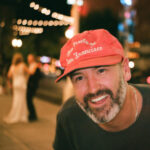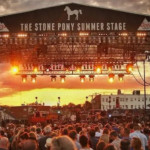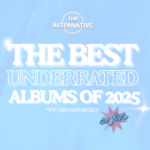Interview: Young Jesus Talks “The Whole Thing Is Just There”
Posted: by The Alt Editing Staff

Speaking with Young Jesus’s frontman John Rossiter is like diving into an ocean of ideas. The literary frontman of the increasingly exploratory, improvisational LA act is constantly stretching his ideas about music, books, his band, and the world—and the band’s latest record, the dense and tangled The Whole Thing is Just There, echoes his inquisitive and adventurous mind. We took an hour to talk with Rossiter about the books that helped inspire the new record, the parallels and divergences between his reading group and the music scene, how to move forward post-election, and more. An edited version of our conversation can be found below.
The Alternative: I wanted to start by asking you about the new record and the title, I read that it comes from a documentary about Philip Guston (A Life Lived), can you tell me a little bit about how Guston and the quote relate to the record?
John Rossiter: Kern [Hauge, drums] has been a big fan of his painting for a while and he introduced us to him. He specifically showed this one specific clip of the documentary where he’s talking about the act of painting or creating or whatever you want to extend it to. If he is going through something, he says, “the whole thing is just there.” You’re always on the verge of discovery or a kind of completeness or fulfillment, and I think that is when you can be open to life. That’s the feeling I go for.
I know that there is no wholeness or completeness. It’s mostly a life in fractures and pieces of things. But to feel as if you are approaching that, or as if it’s a possibility, it’s a beautiful thought to me. It gets at the idea of hope. Maybe we won’t end up in such a great place, but to hope for it and to believe in it is a way to survive and a way to live thoughtfully. If you want to want that for everyone—the wholeness—it’s a good way to live, I think.
Do you feel like your record is grasping for that wholeness or is it pointing out the lack of wholeness?
I think it’s in conversation with that idea. I certainly don’t think we’re looking to solve anything on this record. Or perhaps we are looking to solve things but we are not solving them. I do really think that some problems are just too large for us as humans to grasp onto. That’s kind of a recent thing for me, to be touching all these things and interacting in the world and really being aware of my inability to fathom it all. To be aware of that and to still live hopefully, that’s kind of the idea of the record. It’s not going to give you the wholeness and it’s not going to give you just pieces, it’s hopefully going to be about the trying to. It’s about believing in that action.
A lot of the writing about the last Young Jesus record (last year’s S/T) talked about it having a syllabus or a reading list. It had a number of literary touchpoints. Do you have any of that kind of thing, literary or not, besides Guston, that you drew from for this record?
Definitely. It’s funny, I definitely didn’t intend for there to be like a syllabus attached to it, like it looks like it’s a class or something. I’ve always really valued recommendations from people. You know, I’m a bookseller, and so a lot of what I read comes from other people. My coworkers or friends are like, “you gotta check this out!” And then it takes me a while to get around to it, read it, and fall in love with it. There’s not a lot of me just discovering all this stuff on my own. I thought, “oh, I’d love to extend that to people who don’t work in bookstores!” You know, people can read these books if they want, because I think these are beautiful books, but by no means is it a required thing.
There were definitely things that helped with writing this record quite a bit. I really enjoyed this book by Nathaniel Mackey. It was this trilogy of novels called From a Broken Bottle, Traces of Perfume Still Emanate. It was a really beautiful book. It’s about a fictional jazz group in southern California and their travels. It’s about their experience of playing music. He writes about playing music as if you are really transported. Which, when you really believe in something, I think it really does that. You actually go to a different place in your mind with this group of people that is truly other than what the day-to-day reality is. It’s like a respite, it’s something that I’ve found really important and beautiful.
There’s a reading group that I help organize at the bookstore that’s been really influential in the way I think about life. The people that come to that are kind of actively involved in subverting their ethos for the purposes of having a discussion and listening to each other, which to me was amazing and very important.
When you were talking about the book From a Broken Bottle, Traces of Perfume Still Emanate, you mentioned “transporting” to another reality or idea of reality in reading. Do you think that the record does that all?
I think there are things we feel when we play those songs that are really transporting. I don’t think we’re imagining any specific place, but we are able to lose a little bit of our concern with ourselves in some of the more moving and involved and beautiful moments on the record. The parts that I’m really proud of are the ones where I can fade from view a little bit, where it’s more about this collective of four people and how they’re listening to each other rather than the amazingness of a synth tone or a drum fill or a bass line or a riff. It’s more about how all these things are together and hopefully, it becomes a little bit different than a usual band playing a verse/chorus/verse/chorus structure. While I think those structures can be really powerful too, it’s just not the road that we followed.
Some of your earlier songs like “Oranges” are basically pop songs, especially in comparison with your more recent work. It sounds like it was a thought-out transition into this less traditionally-structured style. Did you plan on that or did it just happen?
I think it’s a combination. I don’t think we planned on it—we just started playing together and it became apparent pretty quickly that we weren’t going to thrive playing more pop songs. After Grow/Decompose, the band members changed and their skill set and the things they’re interested in are very different from the band that played on Grow/Decompose. It was a really hard thing—I’m not saying it’s easy to just switch what everyone’s good at all the time! It took a lot of time to figure out what people enjoyed and where we could meet in the middle. Eventually, it happened and we started to feel really comfortable playing more far out. It didn’t seem to be like we were always saying, “let’s make this weirder!” It was more like, “this feels good going here.” That’s just who we are as a group of people and it’s come through lots of discussions and thinking about what we want as musicians in general. We talk a lot about what we want from life and what we want from music. We talk about what we want from the world. We hope for something that’s adaptable and improvisational and open to the moment and able to repair even through the darkest and most difficult moments.
So do you see your music as a reaction to the dark and difficult moment we’re in right now?
Yeah, I think they’re connected. I think that if you want to see a change in the world, you also have to demand that change from yourself. I was certainly very upset after the election and we started writing this record after the election with a fair amount of anger and frustration. But we also failed ourselves in those moments and we’ve failed ourselves our whole lives. I don’t know, at least for me, I was sort of coasting on what I thought would be a pretty easy world to live in. I was not aware of how difficult it is for a lot of people…for most people. I have just learned a lot in the past five to ten years and I’m still learning.
I think one of the main things we talk about is that, really, if you want the world to change, you’ve got to be involved in it. Not just in a visible outward way, but in an invisible inward way. One of my friends was talking about carrying yourself with quiet dignity, which is something I really admire and maybe I’m not really doing that by being in a band. It’s something that I think about and I certainly try to meditate on how we as a band can change specific things with the four of us. It’s like, how can you change the way four male friends interact? Can we all be vulnerable with each other? How can we learn to trust and share in emotional ways that we weren’t really equipped to growing up?
You mentioned that you facilitate a reading group. Do you think there’s a connection between that small group and the music scene Young Jesus exists within? Do they overlap at all?
There are some of the same people. I definitely try to invite whoever wants to come to come. Kern comes a lot and joins the discussions. And we have one or two of the people from the LA music scene coming. Whereas I think the music scene tends to be geared a little bit more toward younger people, the reading group is maybe not totally evenly distributed but definitely more representative. There are people in their 60s and 70s and there are people who are 18 to 20.
It’s a similar ethos—it’s an ethos I’d like to be able to bring to my interactions in the music scene. There’s also no drinking at the reading group obviously. Shows are different than sitting down to have a discussion. But we’re trying to figure out ways to make shows more of a discussion and more of a collaborative thing. We’d also like to involve more communities than just the indie rock scene, which tends to be traditionally prominently white and often pretty masculine.
We did this thing called Conceptual Beach—which wasn’t so much just like three or four bands playing a show as it was all of us and the audience interacting. It was really great and it didn’t require people to be silent or to drink if they didn’t want to. There was less pressure to be something or to perform as something, a pressure that I’ve often felt at shows. It’s nice to try and break the boundary between audience and performer and try to invite a discussion within that space rather than confine it.
You mentioned drinking a couple times, would you say that there’s an inordinate amount of pressure at rock shows for people to drink?
When I came from Chicago, I drank a lot. I have a kind of knee-jerk reaction to be like, “I need to get away from that!” and prescribe maybe too much of a moral value. It’s a complicated thing—I think in LA I don’t see it as much because everyone has to drive and it’s just not as much of a drinking culture here, which I found really amazing. People are really respectful and thoughtful at shows rather than rowdy or partying. I think there are people who know how to do this responsibly and thoughtfully. I don’t want to sound like I’m a prohibition-type person.
I always tend to think about this in terms of all-ages shows vs. 21 plus shows. Would you say that there are more of one or the other in the LA scene?
Maybe that’s part of my anxiety towards this. Now that we’re on a label and we are playing this tour that’s all venues…which means that most of these shows are gonna be 21 plus. It’s always a push and pull. Like, do we want to try and pursue this thing that requires us to think about and change what we’re comfortable with—which is like all-ages shows that are hopefully cheap and affordable for people. I’m 30 now and I’d like to try and figure out a way to live off of music. Touring makes it so I can’t keep my job, you know?
Now, there are a lot of all-ages shows in LA and we still do those when we’re home. But it gets harder once life just builds up with stuff. Now I’m trying to start a family and considering all these things that 5 years ago I had no consideration of and didn’t think I’d be involved in. I used to devote every waking moment to booking the right shows and being involved in every aspect of this band and every possible thing that could happen. Now, there’s just not enough time in life. And that’s not necessarily a bad thing.
Do you write when you’re on tour?
I write letters to my partner and that’s usually my main concern. I try to read. Most of what we do is try and have long discussions about what we want from life and from each other and what misconceptions we have about how we’re discussing music or playing shows or releasing music. After we signed to Saddle Creek, it was a lot of conversations about what it means to be on a record label and how you can navigate that. We still don’t know how to, but at least we know how we feel about it and each other. We can navigate that space together. I usually do most of my writing while I’m at home and it’s usually just poetry or this like quasi-journal type thing that I work on that has kind of fallen by the wayside in preparation for the tour. I’m excited to get back to that.
Sounds like you all talk pretty openly about everything in your band.
Yeah, I think it’s really important. I think on the bad days it can be exhausting. We had a jam the other night for this song we’re gonna play tonight—“Gulf,” which is this really long song that requires a lot of jamming and communication. So we had reached this moment in the jam where I had maybe been too forceful in where I wanted it to go, like I was insisting on a level of silence and repetition that people were not digging. We had a really long talk about it and it ended up sort of relating more to our lives and where our perspectives are coming from. Like I think I have a fair amount of anxiety about growing older and touring a lot and losing my hearing—these things that lead me to wanting to play quieter. The music has just been all about these discussions. We do try to share a lot because we’re friends and I think that, the way we play, we bring all out all of our self-doubt and our joy and anxiety and care and history to the jams we have together. It can be a real positive if you’re willing to look into that stuff. It can be really tough, too.
Do you play the full 20-minute version of “Gulf?”
Well, it changes every time. It’s usually between 15 and 30 minutes. I don’t know how long it’ll be tonight…I assume it’ll probably be around 20 minutes. Considering it’s a real show, it’ll probably be a little shorter because we’ll get scared. But it’s a really good place to space out and test yourself to see whether your comfortable with yourself enough to not play all the time or not force something into a really intense direction or to jump to the conclusion of the song too early because you think it’s a dud.
Is there a lot of improvisation for the whole set or do you leave it just to that song?
We open every show with a lot of improv and then there is some distributed throughout the whole set, and then there’s obviously “Gulf.” We try to at least have one song that really emphasizes that in a set. For a while it was a song called “Feeling” from S/T. Now I’m pretty excited that it can shift to “Gulf” which is way more open than “Feeling” is. “Feeling” is still open but it has a certain energy to it that you need to maintain. But “Gulf” is so dang long that you don’t need to maintain anything, you just have to figure out new curves with energy and interest.
It’s interesting that you describe “Gulf” as an open song—I’d characterize a lot of the songs on the record that way. But your lyrics are more stoic in a way. In songs like “Gulf” and “For Nana” you have lines that you repeat a lot, the lyrics stay in the same place as the song changes drastically.
I really like repetition. It’s like the idea that when you repeat a word a lot, it starts to sound like nothing. On “For Nana” and with “Gulf,” the more I would put into it, the more I would distract from the feeling that it was evoking. Sometimes words can get away from you and they start to create a funnel that closes off possibilities. I think about that a lot with poetry, how sometimes the best poems are like four lines and maybe twenty words. They’re so open to the moment and you can feel it. I think as a younger lyricist I was more concerned with getting across exactly what I wanted to say exactly the way I wanted to say it and it involved a lot of words. Now I know that even if I use a lot of words, I’m never going to get across what I want to say.
Did you create the album art?
Yeah, I did.
Do you have any way to articulate the connection between the yellows and the sharp lines to the music itself?
Yeah, I think those are hopefully some of the things we’re going for in that watercolor with the yellow and a little bit of the red, the different shades, and how watercolor dries kind of erratically. All of that against a kind of really ordered, structured way of viewing art or the world feels a lot like what our music is. I am a very structured person with certain ideals and certain ways of being myself in the world and I want to be able to open myself up more to different possibilities—being wrong and allowing for chaos and for possibilities that are not my own intention. There are just so many wonderful people and amazing possibilities and I can get pretty obsessed with my own assessment of how things go. Sometimes I think the lyrics operate like that too—I know I’m doing these things, but I’m playing in a band that’s trying to open up more. I feel in some ways really guided by Marcel [Borbon, bass], Kern, and Eric [Shevrin, Drums] and how they think about music. I admire them and I want to learn from them and get to a place where the band is not so much about my ordered and sometimes intense and anxious life can be like.
What kind of music are you listening to right now?
I heard that Strange Ranger EP and I really liked it. I really like what Saddle Creek is releasing right now—Black Belt Eagle Scout and Tomberlin. For the past couple weeks, I’ve been listening to a ton of this Sun Ra record called Landquitity that my partner got me for my birthday. I’ve been jamming that a lot, it’s extremely groovy and beautiful. I’ve been listening to Talk Talk’s Laughing Stock a lot, I come back to this record all the time. My partner puts on this Cher record called Backstage and I really like it! I think it’s beautiful and I hadn’t really known Cher’s work very well before the past month or two. The Nina Simone record Here Comes The Sun. My friend gave me this record BJ4 by Bob James—it’s really cheesy, groovy stuff. I have a real soft spot for that. It has this cover of “Pure Imagination” from Willy Wonka that is killer.
Books and authors recommended by John:
- Down Below by Leonara Kerington
The Radicality of Love by Shpecka Horvatt
On Beauty and Being Justby Elaine Scarry - The Lathe of Heaven by Ursula Le Guin
- Myths, Dreams, and Mysteries by Mircea Eliade
- From a Broken Bottle, Traces of Perfume Still Emanate by Nathaniel Mackey
- The Hidden Life of Trees by Peter Wohlleben
- Joan Murray
- J.H. Prynne
- Laura Riding
- Svetlana Alexievich
Music recommended by John:
- Strange Ranger’s How It All Went By
- Black Belt
- Eagle Scout
- Tomberlin
- Sun Ra’s Landquitity
- Talk Talk’s Laughing Stock
- Cher’s Backstage
- Nina Simone’s Here Comes The Sun
- Bob James’s BJ4
Jordan Walsh | @jordalsh
The Alternative is ad-free and 100% supported by our readers. If you’d like to help us produce more content and promote more great new music, please consider donating to our Patreon page, which also allows you to receive sweet perks like free albums and The Alternative merch.










